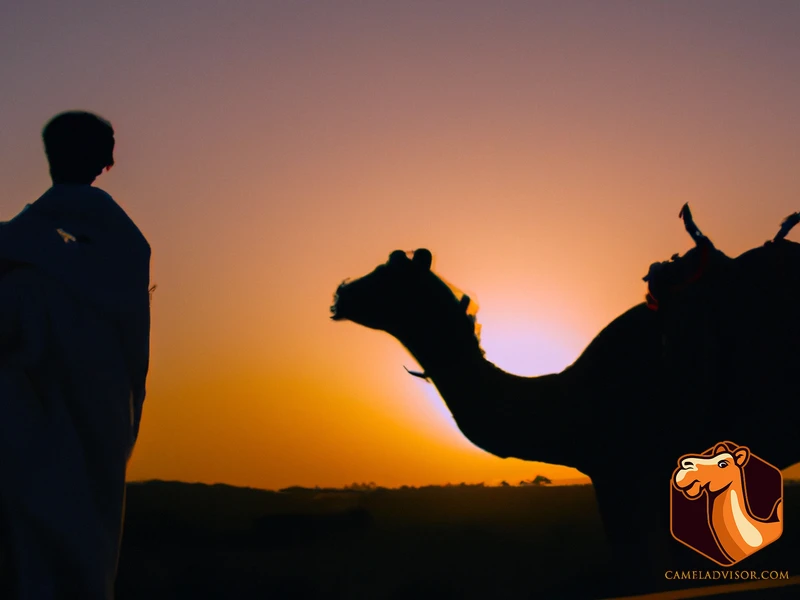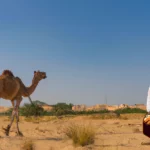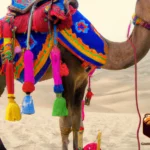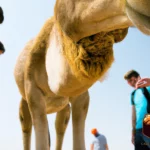Contents
Introduction

Embarking on a camel riding tour in a foreign destination can be an unforgettable experience. However, choosing the right tour operator can make or break your trip. With so many options available it can be overwhelming to decide which one to go with. That’s why taking the time to research and understand your needs is essential. In this guide, we’ll provide you with a step-by-step approach on how to choose the right camel riding tour operator for your next adventure. So let’s get started.
What to Expect in This Guide
In this guide, you can expect to find a comprehensive outline of how to choose the right camel riding tour operator. Research is key when it comes to selecting a tour operator. We will discuss how to read reviews and testimonials to get a better idea of what past customers have experienced, as well as how to check for certifications and associations that ensure the operator is reliable and professional. Additionally, you will learn how to consider the itinerary to ensure it aligns with your interests and ask questions to clarify any doubts or concerns you may have.
Knowing what you want and need in a camel riding tour is also essential, and we will provide tips on choosing the right group size and tour length, as well as camel experience level and budget and costs.
Effective communication is key to ensure a successful tour, and we will provide tips on how to overcome language and cultural barriers, how to clarify expectations with your tour operator, and why getting confirmation in writing is crucial.
Finally, we will provide tips on how to fully prepare for your tour, including considerations for health and safety, what to bring and wear, and how to capture memories with camel riding photo tips. You can also find helpful links to related topics, such as camel ride etiquette, famous camel rides, and camel riding tour packing tips, among others.
By the end of this guide, you will have a thorough understanding of how to choose a reputable and reliable camel riding tour operator that meets your needs and interests.
Research is Key
When it comes to choosing a camel riding tour operator, it’s important to do your research beforehand to ensure that you will have the best experience possible. With so many tour operators out there, it can be overwhelming to make a decision. However, by taking the time to read reviews, check for certifications and associations, and consider the itinerary, you can be confident in your decision. To learn more about the importance of research in choosing a camel riding tour operator, read on. And for those interested, you can find out about the history of bedouin camel riding by following this link.
Read Reviews and Testimonials
When choosing a camel riding tour operator, it’s essential to read reviews and testimonials from previous customers. This step will give you an idea of what to expect from the tour and how the company operates.
Why are reviews important?
Reviews provide valuable insights into the experience of other travelers. They help to highlight the strengths and weaknesses of the tour operator and give you an idea of what to expect. Customers are likely to highlight the good and bad aspects of the tour, which can help you make an informed decision.
Where to find reviews?
Reviews can be found on the tour operator’s website, social media pages, and other review websites. It’s important to read reviews from multiple sources to get a well-rounded view of the company.
What to look for in reviews?
When reading reviews, look for patterns in the comments. If multiple customers mention a specific issue or problem, it’s likely to be a genuine concern. You should also pay attention to the overall tone of the reviews. If the majority of reviews are positive, it’s a good sign that the company provides a quality experience.
Testimonials
In addition to reviews, look for testimonials from previous customers. Testimonials are often longer and more detailed than reviews and provide a more in-depth view of the tour operator. They may also include pictures or videos of the experience.
Reading reviews and testimonials can also give you an idea of the types of people who have used the tour operator in the past. For example, if most of the reviews are from families with young children, it’s likely that the tour is family-friendly.
Important Note: When reading reviews and testimonials, keep in mind that some of them may be fake. Look for reviews and testimonials that seem genuine and provide specific details about the experience.
Reading reviews and testimonials is an important step in choosing the right camel riding tour operator. They provide valuable insights into the experience of other travelers and can help you make an informed decision. To learn more about camel riding, check out these famous camel rides or discover the health benefits of camel riding and its impact on the environment. Don’t forget to follow camel ride etiquette and capture the memories with these photo tips.
Check for Certifications and Associations
When looking for a camel riding tour operator, it is essential to check for certifications and associations to ensure that you are selecting a reliable and competent provider. Here are some steps you can take to verify the legitimacy of a tour operator:
- Do some research: Before booking with a camel riding tour operator, search for information about their affiliations and certifications on their website or through a quick online search.
- Look for the right certifications: Check if the tour operator is certified by any relevant organization, such as the International Camel Organization or the local tourism department. A certification can indicate that the operator has met specific quality standards or environmental regulations.
- Verify associations: See if the operator is part of any professional associations, which can demonstrate their commitment to the industry and their adherence to ethical and sustainable practices.
- Validate permits: If the tour operator is operating within a protected area, check if they have the necessary permits to do so. This will ensure that your camel riding experience is not harmful to the environment or the local wildlife.
Taking these steps can help you select a reputable camel riding tour operator that you can trust to provide a safe and enjoyable experience. Keep in mind that a lack of certifications and associations does not necessarily mean that the operator is unreliable, but it is always better to err on the safe side and choose an operator with proper credentials.
Consider the Itinerary
When choosing the right camel riding tour operator, one important factor to consider is the itinerary. You want to make sure that the tour includes everything you want to see and do, and that it fits your schedule. Here are some key points to consider:
| Duration of Tour | Make sure the length of the tour fits with your availability and schedule. Some tours may be a few hours while others may last several days. |
| Activities and Stops | Check to see what activities the tour includes. Do you want to visit historical sites, see wildlife, or simply ride through scenic areas? Also, consider the number of stops and how much time is allotted for each one. |
| Time of Day | Different tours may be available at different times during the day. For example, some may offer sunrise or sunset tours for different viewing experiences. |
| Group Size | Consider the size of the tour group. Do you prefer a more intimate experience with a smaller group, or do you not mind a larger group? |
| Difficulty Level | Assess the difficulty level of the tour. Will it be easy and leisurely, or will it require more physical activity and stamina? |
| Additional Services | Lastly, check if the tour operator provides any additional services, such as transportation to and from your hotel or meals during the tour. These extra services can make a big difference in the overall experience. |
By considering all of these factors, you can choose an itinerary that best fits your needs and expectations for a successful camel riding tour.
Ask Questions
When choosing a camel riding tour operator, it’s important to ask questions to ensure that you’re getting the best experience possible. Here are some key questions to consider:
| Question | Why to ask? |
| What is the maximum group size? | Knowing the maximum group size can help you determine if the tour will be too crowded for your liking. |
| How experienced are the guides? | The experience of the guides can impact the quality and safety of the tour. |
| What is the itinerary? | Understanding the itinerary can help you decide if the tour will meet your expectations and interests. |
| What is the cancellation policy? | Knowing the cancellation policy can help you plan ahead and avoid any potential fees. |
| What happens in case of an emergency? | Hearing about emergency protocols can help you feel more secure about your safety during the tour. |
| What is included in the tour cost? | Understanding what is included (e.g. transportation, meals) can help you determine the overall value of the tour. |
Asking these important questions will help you make an informed decision when selecting a camel riding tour operator. Don’t be afraid to clarify any uncertainties with the tour operator before booking your tour.
Know What You Want and Need

When it comes to choosing the right camel riding tour operator, it’s important to have a clear understanding of what you want and need from the experience. This can involve considering factors such as group size, tour length, and Camel experience. By taking the time to think through these details and communicate them effectively, you can ensure that you choose a tour operator that’s well-suited to your needs and preferences. So let’s take a closer look at some key considerations in this area.
Group Size and Tour Length
Group Size and Tour Length
When considering a camel riding tour, it’s important to think about how many people will be in your group and how long the tour will last. These factors can impact the overall experience and enjoyment of the tour.
| Group Size | Tour Length | Effect on the Tour |
|---|---|---|
| Small Group | Short Tour | Allows for more personalized attention from the tour guide and a more intimate experience. May feel rushed if trying to fit in a lot of sights. |
| Small Group | Long Tour | Allows for a deeper exploration of the region and more flexibility with the itinerary. May become too social for those looking for a more solitary experience. |
| Large Group | Short Tour | A more social experience with the chance to meet new people, but less personalized attention from the tour guide. May feel crowded or rushed. |
| Large Group | Long Tour | Can be overwhelming for those who prefer a quieter experience. However, a larger group can allow for more varied perspectives and shared experiences. |
Knowing your preferences in terms of group size and tour length can help you narrow down your options and choose the right camel riding tour for you.
Camel Experience
When choosing a camel riding tour operator, it’s important to consider your level of camel experience. Some tour operators may cater to experienced riders, while others may be better suited for beginners. Here are some factors to consider:
| Factor | Description |
| Experience Level | Make sure the tour operator offers tours that cater to your skill level, whether you’re a beginner or experienced rider. Ask what type of terrain the tour will cover (i.e. sand dunes or flat ground) and what the pace will be. |
| Training and Support | Find out what kind of training and support the camel riding tour operator offers. Will there be a guide riding alongside you to provide instructions and assistance? Will there be a training session before the tour begins? |
| Equipment | Ask about the quality and condition of the equipment used. Are the saddles comfortable and in good condition? Do the camels look healthy and well-cared for? |
| Length of Tour | If you’re a beginner, you may not want to embark on a long tour right away. Consider starting with a shorter tour to get a feel for camel riding before committing to a longer expedition. |
| Customization | If you have specific needs or requests (i.e., you want to ride with a certain person or you want to include other activities in your tour), ask the tour operator if they can customize the tour to fit your needs. |
Considering these factors will help ensure that you choose a camel riding tour operator that is well-suited to your individual needs and skill level.
Budget and Costs
When it comes to choosing the right camel riding tour operator, budget and costs are an important consideration. Here are some factors to keep in mind:
- Determine your budget: What can you afford to spend on a camel riding tour? Be realistic about what you can afford and keep in mind that the cheapest option may not always be the best.
- Compare prices: Research several tour operators and compare their prices. What is included in the cost of the tour? Are there any hidden fees or additional expenses that you should be aware of?
- Consider off-peak season: If you have flexibility in your travel dates, consider booking during off-peak season when prices may be lower.
- Look for discounts: Some tour operators may offer discounts for students, seniors, or large groups. Be sure to ask if any discounts are available.
- Beware of scams: If a price seems too good to be true, it probably is. Be wary of tour operators who ask for payment up front or who are hesitant to provide pricing information.
Keep in mind that your budget should not be the only consideration when choosing a camel riding tour operator. You want to ensure that you are getting a quality experience and that your safety and comfort are a top priority. By researching and comparing different options, you can find a tour operator that meets your needs and fits within your budget.
Communicate Effectively
As you prepare to embark on your camel riding tour, effective communication with your tour operator is key. With potential language and cultural barriers, it is important to take the necessary steps to ensure that you have a clear understanding of what to expect before and during your tour. In this section, we will explore some tips and tricks for communicating effectively with your tour operator to help ensure a smooth and enjoyable experience.
Language and Cultural Barriers
When choosing a camel riding tour operator, it’s important to consider the potential language and cultural barriers that may arise during the tour. Here are a few things to keep in mind:
- Language: If you’re traveling to a country where English is not the primary language, it’s important to make sure that your tour guide is fluent in your native language or at least has a good command of English. This will ensure that you can communicate easily with your guide and enjoy a more immersive experience. Take some time before booking to communicate with the tour operator and gauge their language proficiency.
- Cultural Differences: Different cultures have different customs and etiquette, and it’s important to make sure that you’re aware of the local customs and respectful of them. For example, in some cultures, it’s customary to remove your shoes before entering a home or religious site. Make sure you have read up on any customs that you should be aware of before your tour, and ask your tour guide if you have any questions.
- Cultural Sensitivity: When you’re traveling to a foreign country, it’s important to be respectful of the local culture and customs. Be aware of any dress codes or cultural practices that may be expected of you. Also, be mindful of the fact that your cultural differences may make you and your tour guide see things differently. Try to approach things with an open mind and be willing to learn and adapt to new cultural experiences during your tour.
By taking the time to consider these factors, you can ensure that you have a more enjoyable and fulfilling camel riding tour experience.
Clarify Expectations
When booking a camel riding tour, it’s important to have clear communication with the tour operator to ensure that your expectations match the reality of the experience. Here are some important things to clarify before booking:
- What is included in the tour price? Make sure you understand what’s included in the price of the tour, such as meals, accommodations, and transportation. Some operators may have additional fees for certain activities or services.
- What is the daily schedule? Ask for a detailed itinerary so that you know what to expect each day. This will also help you pack appropriately for any activities or events.
- What are the accommodations? If the tour includes overnight stays, make sure you understand what the accommodations will be like. Are you sleeping in a tent or a hotel? What are the amenities?
- What is the level of physical activity? Camel riding can be physically demanding, so make sure you understand the level of activity involved in the tour. Are there any hikes or other physical activities involved?
- What is the level of camel riding experience required? If you’re a beginner camel rider, make sure the tour is appropriate for your skill level. If you have prior experience, be sure to communicate your level to the tour operator so that they can plan the itinerary accordingly.
- What is the group size? The size of the tour group can impact the experience, so make sure you know how many people will be on the tour with you.
By clarifying these expectations with the tour operator beforehand, you can ensure that you have a positive and enjoyable camel riding experience.
Get Confirmation in Writing
Before booking your camel riding tour, it is important to get a written confirmation of all the details from the tour operator. This will help you avoid any misunderstandings or unexpected surprises on the day of the tour.
Here are some tips to help you get confirmation in writing:
- Ask for a contract: Ask the tour operator to provide you with a contract that outlines all the details of your tour, including the itinerary, group size, and costs.
- Review the contract: Make sure to read the contract carefully and ask the tour operator for clarification if there is anything you don’t understand.
- Confirm the details: Once you are satisfied with the contract, confirm all the details with the tour operator, including the tour dates, start and end times, meeting point, and any additional activities or services included in the tour.
- Get a receipt: Make sure to get a receipt or confirmation of payment from the tour operator and keep it in a safe place.
- Keep in touch: Stay in touch with the tour operator leading up to the tour to confirm that everything is still on schedule and to address any last-minute questions or concerns.
By following these steps and getting a written confirmation of all the details, you can ensure that your camel riding tour is a positive and memorable experience.
Prepare for Your Tour
As the day of your camel riding tour draws closer, it’s important to make sure you’re fully prepared. You want to have a safe and enjoyable experience, so it’s necessary to take certain health and safety considerations into account. Additionally, knowing what to bring and wear can make all the difference in having a comfortable and memorable trip. Oh, and don’t forget to pack your camera! Let’s dive into some tips on how to get ready for your tour.
Health and Safety Considerations
When it comes to choosing the right camel riding tour operator, it’s important to consider health and safety considerations. Here are some important factors to keep in mind:
- Physical Ability – Camel riding tours can often be physically demanding, especially for those with back or joint problems. It’s important to assess your own physical ability and communicate any concerns with the tour operator prior to booking.
- Medical Conditions – If you have any pre-existing medical conditions, it’s important to speak with your doctor before booking a camel riding tour. The hot and dry climate may exacerbate certain conditions and it’s important to take the necessary precautions to ensure your safety.
- Hydration and Sun Protection – It’s essential to stay hydrated during a camel riding tour, especially in hot and dry climates. Bring plenty of water and wear protective clothing, such as a hat and sunscreen, to avoid sunburn and heat exhaustion.
- First Aid Kit – Before embarking on a camel riding tour, make sure that the tour operator has a fully stocked first aid kit and knowledge of basic first aid procedures.
- Training and Safety Protocols – Ensure that the tour operator has trained guides who are familiar with the animals and the terrain. The operator should also have proper safety protocols in place in case of an emergency.
Taking these health and safety considerations into account will help ensure a safe and enjoyable camel riding tour. Remember to communicate any concerns with the tour operator and come prepared with the necessary supplies to stay safe and comfortable during the tour.
What to Bring and Wear
When preparing for your camel riding tour, what you bring and wear can greatly impact your experience. Here are some items to consider packing for your adventure:
- Clothing: Dress in layers to prepare for changes in temperature. Loose-fitting, breathable clothing is ideal for comfort and sun protection. Consider a wide-brimmed hat or scarf for added sun protection.
- Footwear: Closed-toe shoes with a sturdy sole are recommended for a comfortable ride on the camel. Avoid flip-flops or loose sandals, as they can easily slip off during the ride.
- Sunscreen: Protect your skin from the sun’s harmful rays with a high SPF sunscreen. Apply before and during the ride, especially on areas that will be exposed to the sun.
- Bug spray: Depending on the location of your tour, an insect repellent may come in handy to prevent bug bites.
- Water bottle: Staying hydrated is important, so bring a refillable water bottle. Some camel riding tour operators may provide water, but it’s always best to have your own supply.
- Snacks: Depending on the length of your tour, you may want to bring a light snack such as granola bars or fruit to keep your energy up.
- Camera: Don’t forget to capture the memories! Bring a camera or smartphone to snap photos of the unique scenery and your camel ride.
Remember to check with your tour operator to see if they have any specific requirements or recommendations for what to bring and wear on the tour. With these essentials packed, you’ll be ready for a comfortable and enjoyable camel riding experience.
Don’t Forget Your Camera
When going on a camel riding tour, one of the most important things to remember is to bring a camera to capture the unique experience. Here are some tips to help ensure that you get the most out of your photography:
| Tip | Description |
|---|---|
| Charge your camera battery | Make sure that your camera battery is fully charged and that you have a spare battery or a charger just in case. |
| Use a strap | Attach a strap to your camera so that you do not drop it while riding the camel. |
| Bring extra memory cards | You never know when a stunning photo opportunity might happen, so it is always best to have extra memory cards on hand. |
| Consider the lighting | Take note of the lighting conditions during the tour, and adjust your camera settings accordingly. For example, if the lighting is dark, adjust your ISO setting to a higher number. |
| Capture the surroundings | It’s not just the camels that make the tour experience memorable. Take advantage of the opportunity to capture the stunning landscapes and surroundings as well. |
| Ask for permission | While you might be excited to take photos of the locals, always ask for permission before taking their photo out of respect for their culture. |
By following these tips, you can ensure that you capture the memories of your camel riding tour to cherish for years to come. Don’t forget to take plenty of pictures and have fun!
Conclusion
In conclusion, choosing the right camel riding tour operator requires careful research and effective communication. By reading reviews and checking for certifications, you can ensure that you are selecting a reputable and experienced tour operator. It is also important to consider your own wants and needs, such as group size, camel experience, and budget.
When communicating with the tour operator, make sure to clarify expectations and get confirmation in writing to avoid misunderstandings. Additionally, preparing for your tour involves considering health and safety considerations, as well as packing appropriate attire and equipment.
Ultimately, a well-planned and enjoyable camel riding tour can be an unforgettable experience. With the right operator and preparation, you can fully immerse yourself in the beauty and culture of the desert while riding atop some of the most fascinating and majestic animals on earth. Don’t hesitate to take the time to thoroughly research and communicate with your tour operator to make the most of your camel riding experience.
Frequently Asked Questions
Question 1?
What should I consider when choosing a camel riding tour operator?
Question 2?
How can I know if a tour operator is certified or a member of any association?
Question 3?
What should be my main consideration when choosing a camel riding itinerary?
Question 4?
Is it important to ask questions before booking a tour?
Question 5?
What factors can affect the group size and tour length?
Question 6?
Should I have previous camel riding experience before booking a tour?
Question 7?
How can I determine whether a tour operator’s cost is reasonable?
Question 8?
What should I keep in mind when communicating with a tour operator from a different culture?
Question 9?
What should I do if my health or safety is at risk during the tour?
Question 10?
Are there any dress codes or restrictions on what I should wear during the camel riding tour?







